
This week the OMA attended the first ever Library Diversity and Residency Studies (LDRS) Conference in Greensboro, North Carolina. The conference focused on Diversity, Equity, and Inclusion in libraries, including but not restricted to Library Diversity Residency programs. The conference was hosted by UNC Greensboro in collaboration with the ACRL Diversity Alliance and the Association of Southeastern Research Libraries (ASERL). The LDRS brought together individuals from academic and public libraries, LIS programs, and other interested groups.
Natalia Fernández, Curator of the Oregon Multicultural Archives & OSU Queer Archives, as well as the Supervisor of the OSULP Diversity Scholars Program (DSP), gave a presentation on the DSP as part of the panel “Best Practices in Establishing Library Diversity Residency Programs” – below are her presentation slides and notes…
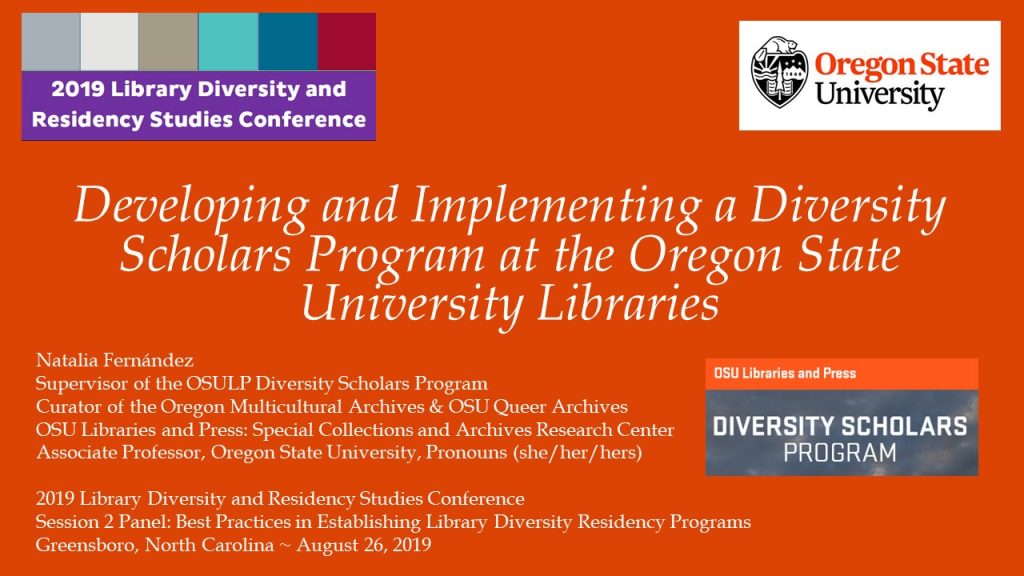
My name is Natalia Fernández and I am the supervisor of the Oregon State University Libraries’ Diversity Scholars Program.

To give you an overview of what I plan to share with you -– first, I will give some local context for our program by sharing information about Oregon, Oregon State University, the OSU Libraries, and about me. Then, the bulk of my presentation will consist of information about the development and implementation of the DSP, along with some of our challenges faced and lessons learned, as well as our plans for the future.
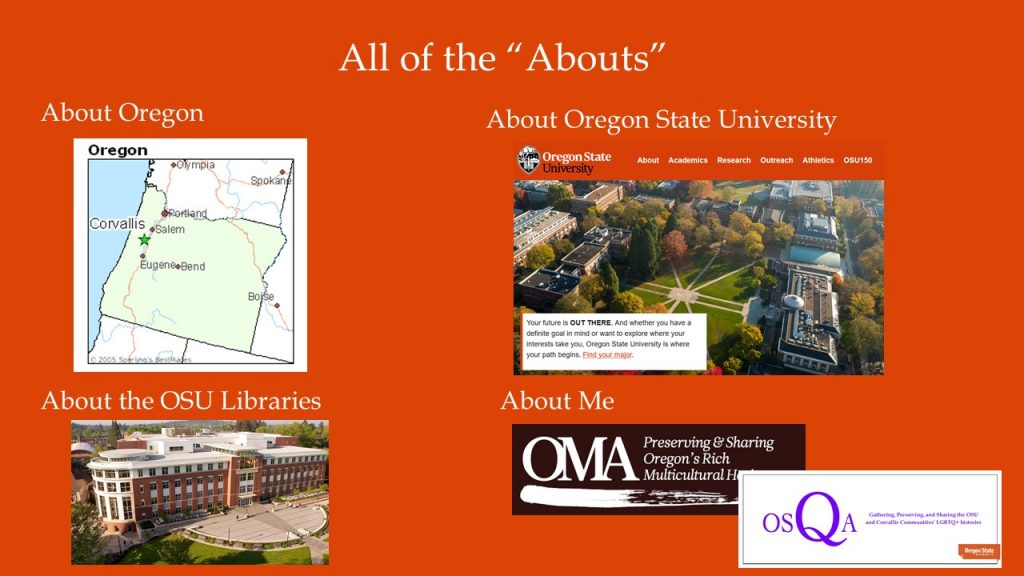
According to Oregon’s 2018 population estimate, 26% of the people of living in the state identify as people of color. At OSU, in the 2018-2019 academic year, students of color accounted for just over 25% of about 31,000 students. The OSU Libraries main campus in Corvallis, with 2 branch libraries on the coast and in Central Oregon, employs over 70 Faculty/Staff, along with dozens of student employees. Both the state of Oregon and Oregon State University have a dark history in its treatment of people of color as well as LGBTQIA communities.
My primary job as the curator of the Oregon Multicultural Archives and OSU Queer Archives, a position which I have been in since late 2010, is to collaborate with LGBTQIA and communities of color to empower them to preserve, share, and celebrate their stories in an effort to both document that dark history and showcase the perseverance and accomplishments of these communities in their journey toward social justice. My work includes collection development, instruction, exhibit curation, reference, and other typical duties of an archivist. Additionally, as I mentioned earlier, I am the supervisor of the Diversity Scholars Program and the chair of the DSP Committee.
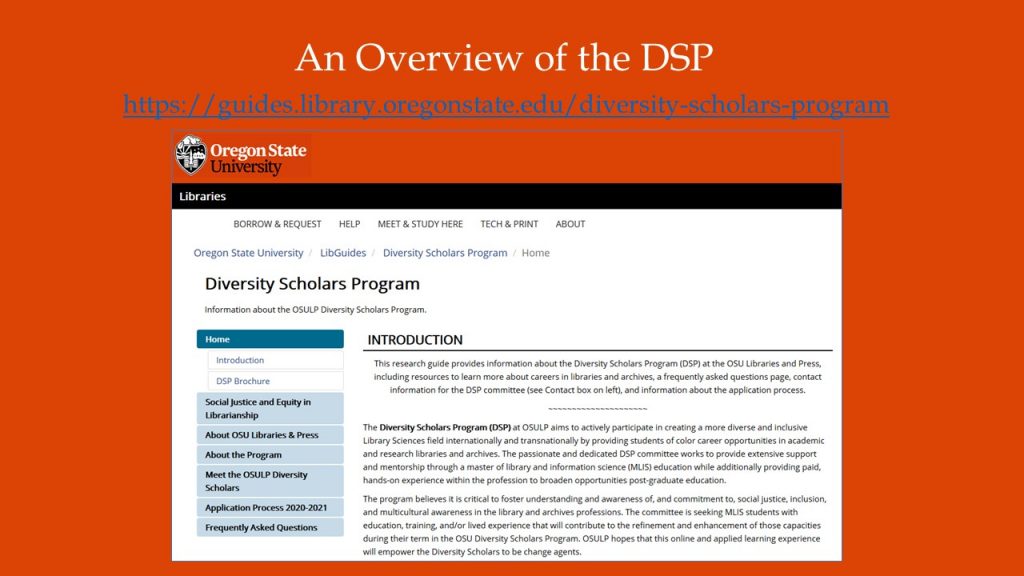
Within the state of Oregon there is no university with a masters in library science program. Over the years, our library has employed graduate students obtaining their MLIS degrees, either from hybrid or online-only programs, through paid positions as well as for-credit internships and practicums. However, prior to the DSP, our library had never proactively engaged in the recruitment and employment of MLIS students of color.
Our program aims to actively create a more diverse and inclusive Library Sciences field by providing extensive support and mentorship for students of color who are pursuing their MLIS degree online. The DSP provides a paid, hands-on experience within the profession to broaden the students’ opportunities after completion of their graduate degree. Established in 2015 and implemented in 2018, the program provides the scholars with experiences in the areas of their choosing, along with opportunities for professional development, scholarship, and service within an academic library setting.

Research ~ In the spring of 2015 our University Librarian charged a team of three librarians with investigating the options that the library had to create a diversity resident librarian position. The library sought to create such a position to promote diversity within our profession, reflect the changing demographics among our students, and to increase opportunities for diverse candidates to explore academic librarianship. The team examined what other academic research libraries have done, spoke with diversity resident scholars, and reviewed the relevant literature. The group wrote a white paper for the Library Administration Management and Planning group that the University Librarian leads to document their findings and offer recommendations about what might work best for our library. Based upon feedback from current and former resident scholars, along with the makeup of already existing opportunities within librarianship, the team decided to recommend the creation of a program whose positions would support current and local MLS students of color, not post-graduates. Our library administration agreed, and a call went out to recruit volunteers for the next phase of the DSP creation process. By November 2015, a DSP Committee had been formed.
Development ~ DSP Committee members were especially inspired by April Hathcock’s 2015 article “White Librarianship in Blackface: Diversity Initiatives in LIS” in which she explains how diversity programs, especially the application process, are coded to promote whiteness, and the need to mentor early career librarians in both playing at and dismantling whiteness within the profession. We knew that we needed to think about the full cycle of the program: the recruitment and application process to encourage people of color to pursue a career in librarianship, the program experience itself to include a strong mentorship competent, support in the job search for program participants, and continued support in the post MLIS experience. In order to more fully develop our program ideas, the committee hosted a one time paid internship for the summer of 2016 to serve as a smaller scale version of how we envisioned the program. After that, we began meeting with our Human Resources contact to develop the position, secured funding from our university librarian, developed a position description, and began the promotion and recruitment process.
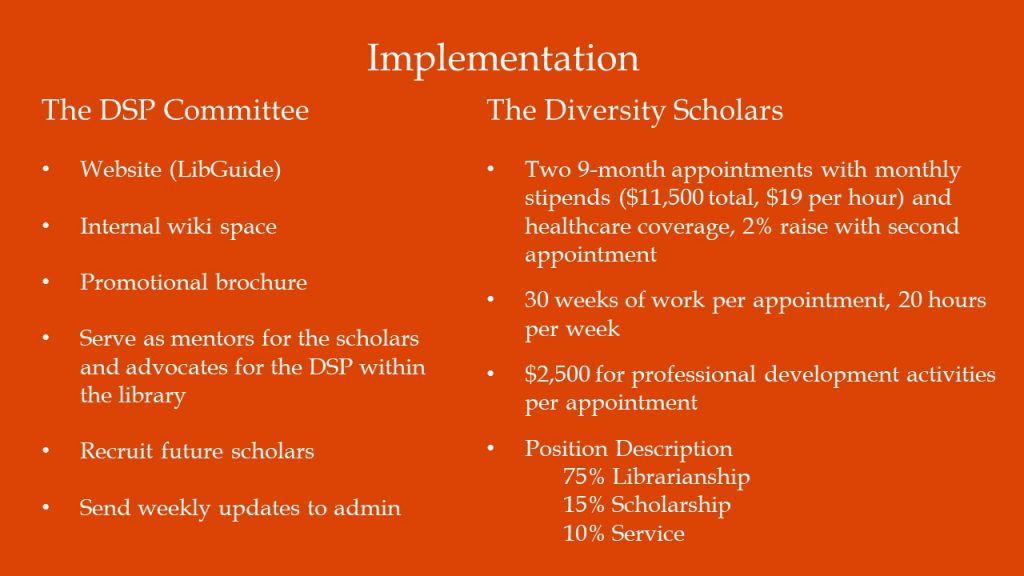
To fully implement the program, the DSP Committee created a website, used an internal wiki space to communicate and document activities, and created a promotional brochure. The members of the committee represent the majority of the departments in the library and serve as advocates for the program, as well as mentors and personal contacts for the scholars. The committee works to recruit potential future scholars and sends weekly updates to the library’s administrative group to keep them excited and updated about the program.
The program is set up so scholars have the opportunity to work a full 18 months in the library. They work 30 weeks per 9 month appointment at 20 hours per week. In addition to their salary, they receive $2500 in professional development funds to attend conferences or other relevant activities.
The Diversity Scholars position description is formatted in the same was as it is for our tenure track librarians – they are expected to attend library-wide and relevant departmental meetings, work on their scholarship, and serve on committees. They each have their own cubicle space and are treated as colleagues.

Our first Diversity Scholar just recently completed her 18 month appointment in the program, our second scholar will begin her second 9 month appointment in October, and our third scholar begins in October as well. All three of the Diversity Scholars are Latinx women in their mid-to-late 20s, and two of the three scholars were library student employees and OSU undergrads. The first two scholars chose to focus on teaching and engagement, as well as public services activities, and we know that our third scholar has an interest in archives.
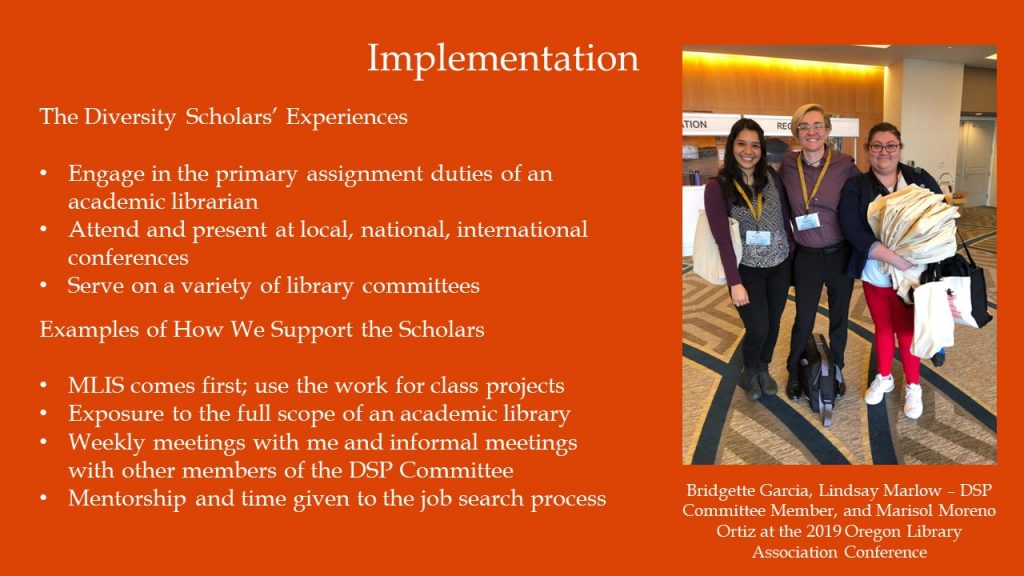
The Diversity Scholars are expected to engage in the primary assignment duties of an academic librarian. As examples, the scholars have worked with students in the library’s writing studio, taught library information sessions and workshops, tabled at events, worked the reference desk, complied and analyzed library data, and participated in library wide as well as relevant departmental meetings. As a part of developing their scholarship, the scholars have attended and presented at local Oregon conferences, national ones like ALA, and even one international conference. They have also served on a variety of library committees such as the library awards committee, search committees, and the library employee association.
To support our scholars, we make sure that they know that their MLIS studies come first and they are strongly encouraged to use their work experiences for class projects. And, we offer a flexible work schedule so they can best manage their time. Scholars are given the opportunity to experience the full scope of an academic library, working in all of our departments and meeting with administrators. They are then able to determine their areas of focus. I meet with the scholars on a weekly basis, and the other members of the DSP Committee also meet with them informally.
An experience that occurred with our first scholar – that we plan to duplicate with the other scholars – is to mentor the scholars through the job search process. Our first scholar used the majority of her last 10 weeks in the program to apply for jobs and participate in job interviews. The Committee reviewed her cover letters, prepped her for phone interviews, and edited her on-campus presentation materials.

Challenges
I listed recruitment and salary together because they are very much intertwined. While the position does include healthcare coverage, the salary is low, especially for the cost of living in Corvallis. We have no funds to assist with relocation costs so the Committee feels it would be a disservice to ask someone to move to Corvallis with no promise of assistance with moving costs. Therefore, our recruits have been students who are already living in the Corvallis commuter area. Another challenge to recruitment is because there is no in-state MILS program, the students we are recruiting into the profession are having to pay out-of-state tuition costs. Therefore, it is essential for us as a Committee to not only let students know of scholarship opportunities, but to actively help them in the application process – which we have done with some success. So far, our first two Diversity Scholars have been selected as ALA Spectrum Scholars.
One of my personal pet peeves is when colleagues call the Diversity Scholars “interns” since the program is structured to treat them as colleagues to our academic librarians. However, the reality is they are not being paid at that level so while we want them to have the same experiences of academic librarians, it is essential for us to not use them to cover the duties of someone at a much higher pay scale. We try to find the balance to this by making sure that the activities and projects the Scholars take on are of their choosing and help them in building the resume they want that will benefit them in their future career.
Another challenge the program faces is that while it was always the long-term goal that the DSP would build a cohort among the scholars, the reality is that so far, between scheduling issues and difference in personalities, this has yet to occur, but the program is still very new, so we hope that as we continue building the program, this will occur in the future.
Lastly, we are continuously working on developing and implementing meaningful assessment – as of now, we ask the scholars to maintain reflective journals and write self-evaluations of their work, and as their supervisor, I seek input from their peers. But in terms of long-term assessment, the Committee feels the true success of the program is whether or not the scholars find employment in an area of their choosing, as well as the long-term retention of the scholars in the profession.
Lessons Learned
In terms of lessons learned, it has be incredibly important for us to secure and sustain administrative support. Our program is in the position that is was a top down initiative, so while we have the support of our university librarian, it is still important for us to assess the program, write reports, and continue to advocate for the scholars.
Developing departmental buy-in has been key to the success of this program. I keep the library’s administration, including department heads, updated weekly on the program, and I meet both formally and informally with them to ensure the projects and activities of the scholars in other departments are going well.
One of my main priorities as the Diversity Scholars’ supervisor is to be their advocate while also empowering them to advocate for themselves. I have conversations with them about the politics of not only the inter-workings of our library, but the professional as a whole.
And lastly, one of our lessons learned has been for the need to practice strategic and proactive recruitment. We have plans for this year to connect with various groups on campus to speak directly with undergraduate students about the possibility of working in libraries, archives, and other cultural heritage institutions as a potential career path.

In terms of our plans for the future, we will continue to support and mentor our first Diversity Scholar and look forward to seeing what comes next for her, and we are excited to host our 3rd Diversity Scholar and begin recruitment for our 4th. As we have more people participate in the program, we hope to build a strong network among our Diversity Scholars. We are in conversation with our university librarian to secure permanent funding for the positions and raise the salary. In order to ensure the program’s sustainability, we need to expand the DSP Committee membership, especially to include representatives from all of our departments. Lastly, we plan to continue and expand the assessment of the program’s impact both for the library and for the scholars themselves.
To conclude, while we recognize that our program is only a small contribution to the profession, we see how it has a positive impact on our library, and most importantly, the lives of our diversity scholars.


